Smart Protection: Your Guide to Choosing the Best Medical Alert Monitoring System IN 2024
As our loved ones age, their safety becomes a paramount concern, especially if they live alone or have medical conditions. It’s in these moments that we realize the crucial role of technology in ensuring their security and independence. Enter the best medical alert monitoring systems, a transformative development in health care and personal safety.
Best Overall
Best For Value
Best For Lifetime Guarantee
Best Mobile Medical Alert System
Brio House is an independent review site. We may earn money when you click links inside our site.
As our loved ones age, their safety becomes a paramount concern, especially if they live alone or have medical conditions. It’s in these moments that we realize the crucial role of technology in ensuring their security and independence. Enter the best medical alert monitoring systems, a transformative development in health care and personal safety.
Medical alert monitoring systems are designed to provide an essential lifeline, connecting users to emergency services at the touch of a button. Whether it’s a sudden medical emergency, a fall, or any other type of urgent situation, these systems provide immediate access to help when it’s most needed. They have become an indispensable tool in modern health care, ensuring that help is always at hand, 24/7.
Yet, with so many options available, choosing the best medical alert monitoring system can feel overwhelming. Each system offers different features, from fall detection to GPS tracking, at varying price points. So how do you navigate this crowded landscape to find the right system for your needs or those of your loved ones?
The Essentials of Medical Alert Systems
A medical alert system, also known as a Personal Emergency Response System (PERS), is designed to signal the presence of a hazard requiring urgent attention and summon emergency medical personnel. Usually, these systems are comprised of a wearable device—often in the form of a necklace or wristband—equipped with a help button. When pressed during an emergency, the device connects to a monitoring center with trained professionals ready to dispatch the necessary help.
The main objective of these systems is to ensure that users can live independently while also having access to immediate assistance if needed. They are especially beneficial to seniors, people with disabilities, those suffering from serious health conditions, and anyone needing help in an emergency.
Two Primary Types of Medical Alert Systems

In-Home Systems
These systems are designed for use within the home and often connect to a monitoring center via a landline. They usually consist of a base station and a wearable help button. Some advanced in-home systems include features like fall detection, wellness checks, and medication reminders.
Mobile Systems
These systems operate on a cellular network, making them ideal for active individuals who frequently leave their homes. Mobile systems usually feature a portable base station and a wearable device, providing protection wherever there is cellular coverage. These systems often incorporate additional features like GPS location tracking, ensuring the user can be found in an emergency, no matter where they are.
Understanding these basics of medical alert systems is the first step in selecting the best one for your needs.

How does a medical alert system work?
Medical alert systems work by connecting the user to help at the press of a button. When the button on the base unit or wearable device is pressed, the system connects to a response center. The operator at the center can communicate with the user through a speaker on the device, evaluate the situation, and then dispatch emergency services or contact a caregiver as needed.
What are the Best Medical Alert Monitoring System in 2024?
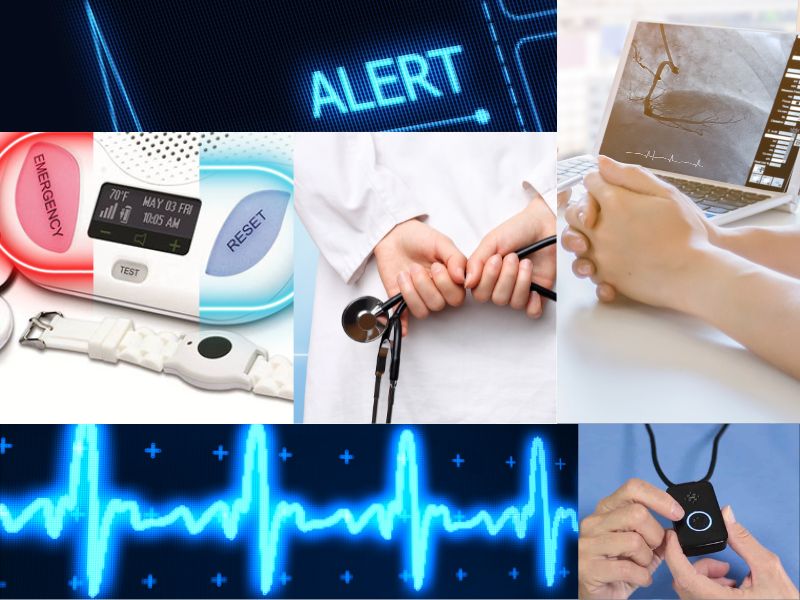
Reviews: The Top Medical Alert Systems in 2024
The medical alert system market has experienced a significant boom, with various systems tailored to meet unique individual needs. Here, we introduce the top five medical alert systems of 2023, highlighting their key features, pros, and cons.
1. Medical Guardian: Comprehensive protection wherever you are
Best Overall
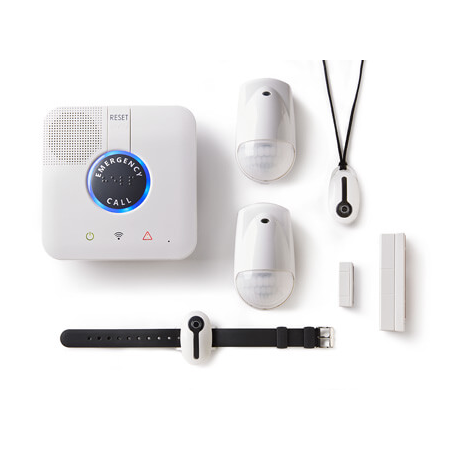
Medical Guardian
Our Rating:

4.8
Key Features:
- GPS location tracking
- automatic fall detection
- direct connection to a monitoring center
- wearable waterproof pendants
- cellular in-home medical alert system.
PROS
CONS
2. Bay Alarm Medical: Premium safety at an affordable price
Best for Value
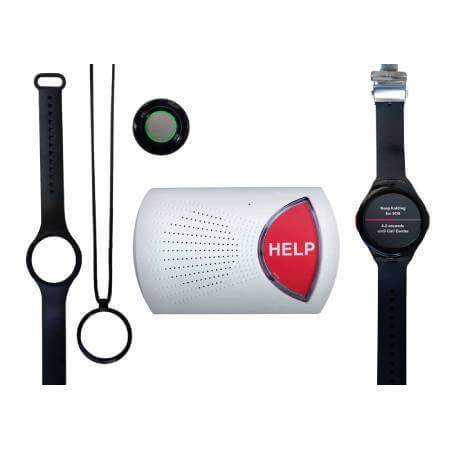
Bay Alarm Medical
Our Rating:

4.7
Key Features:
- 24/7 professional monitoring
- automatic fall detection
- GPS location tracking
- in-car medical alert device
- multilingual protection.
PROS
CONS
3. Life Alert: Security for life with renowned reliability
Best for Lifetime Guarantee
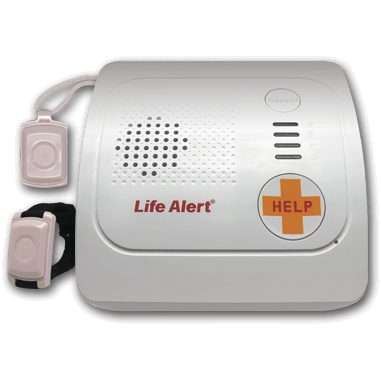
Life Alert
Our Rating:

4.6
Key Features:
- 24/7 professional monitoring
- home intrusion protection
- GPS location tracking
- bathroom and shower coverage
- mobile app support.
PROS
CONS
4. MobileHelp: Safety on the move, when you need it most
Best Mobile Medical Alert System
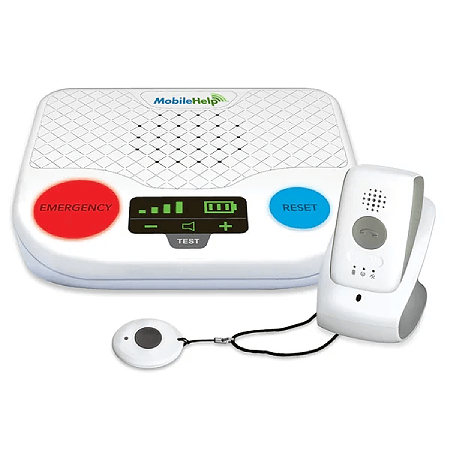
MobileHelp
Our Rating:

4.7
Key Features:
- GPS location tracking
- no landline required
- fall detection
- medication reminders
- MobileHelp Connect online tracking platform.
PROS
CONS
5. Philips Lifeline: Groundbreaking fall detection for peace of mind
Best for Automatic Fall Detection
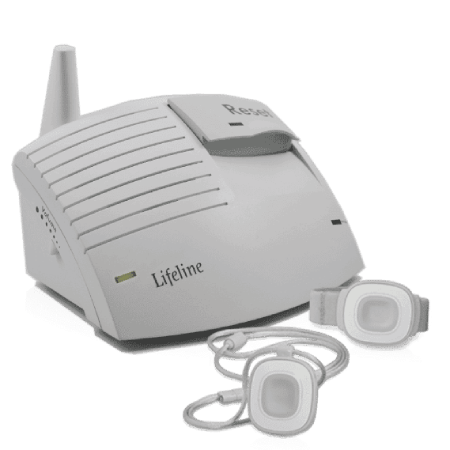
Philips Lifeline
Our Rating:

4.6
Key Features:
- Superior auto fall detection technology
- GPS location tracking
- 24/7 access to trained care specialists
- personalized response plans
- HomeSafe and GoSafe options.
PROS
CONS
The medical alert system you choose depends on individual needs and circumstances. Remember, the best system is the one that offers the features most relevant to you or your loved ones and fits within your budget.
Comparing Best Medical Alert Systems
Comparing the top options available in choosing the best medical alert system can provide valuable insights. Let’s compare our top five systems based on their main features, cost, and customer service:
- Medical Guardian: Known for its versatile range, Medical Guardian offers both in-home and mobile systems. It stands out for its comprehensive protection and reliable customer service. While it tends to be on the higher end of the price spectrum, its no long-term contract policy offers flexibility. However, the add-on cost for automatic fall detection is something to consider.
- Bay Alarm Medical: If you’re looking for value, Bay Alarm Medical devices could be an excellent choice. It provides a wide range of affordable systems, all backed by 24/7 professional monitoring. While its advanced features may cost extra, its budget-friendly plans and multilingual support make it a favorite among users.
- Life Alert: As one of the most well-known providers in the industry, Life Alert offers a lifetime guarantee on their systems. Their home intrusion protection and comprehensive protective services stand out. However, they require a three-year contract, and some may find their equipment not as modern as other competitors.
- MobileHelp: Specifically designed for active individuals, MobileHelp excels with its mobile medical alert systems. It boasts a comprehensive online platform, MobileHelp Connect, and does not tie users to long-term contracts. The less extensive range for in-home systems and extra cost for fall detection are aspects to consider.
- Philips Lifeline: As a leader in automatic fall detection technology, Philips Lifeline stands out for its innovative and reliable solutions. While their services are priced higher than some competitors, they provide quick response times and personalized care plans.
Each of these medical alert systems has its strengths and potential drawbacks. As such, your unique needs, budget, and lifestyle should guide your decision. Your ideal system should offer the best cost, features, and reliability for you or your loved one’s situation.
Key Features to Consider
As you navigate the landscape of medical alert systems, understanding the importance of key features can guide you toward the right choice. Here are some significant features to consider:
Automatic Fall Detection
Falling is one of the most common emergencies, especially among the elderly, that could necessitate immediate medical attention. Automatic fall detection is a feature that can automatically sense when the wearer has taken a fall, triggering a call to the monitoring center even if the wearer cannot press the help button. This feature can be life-saving, especially when the fall renders the person unconscious or otherwise incapacitated.
GPS Location Tracking
For mobile medical alert systems, GPS location tracking is essential. This capability allows emergency services to locate the wearer accurately in an emergency, regardless of whether they are at home or out and about. This is especially useful for users who maintain an active lifestyle, frequently leave their homes, or may risk becoming disoriented or lost.
Monitoring Centers
The effectiveness of a medical alert system is closely tied to the quality of its monitoring center. When an alert is triggered, the system contacts a monitoring center, where trained professionals assess the situation and promptly dispatch appropriate emergency services. The best medical alert companies have reliable, efficient monitoring centers that operate 24/7, ensuring help is always available when needed.
Battery Life
Another crucial factor to consider is the battery life of the alert system. This is particularly important for a mobile device, which relies on being charged regularly. Longer battery life means less frequent charging and a lower risk of the device running out of power when needed. Most systems have a battery life ranging from 24 hours to several days, so consider your or your loved one’s lifestyle and ability to manage to charge the device.
Understanding these features and their significance can significantly narrow your choices and help you choose the medical alert system that best meets your needs.
Cost and Affordability
Cost is often a critical factor when choosing a medical alert system. Let’s break down the financial considerations, including the initial cost, monthly fees, equipment charges, and the concept of a “price lock guarantee.”
Medical Alert Systems Cost & Monthly Fees
The cost of a medical alert system can vary widely depending on the type of system (in-home or mobile), the range of features, and the provider. Prices for monthly monitoring services typically range from around $20 to over $50. Some companies offer discounts for paying semi-annually or annually. Remember, the monthly cost often reflects the level of service and features provided, so while lower prices may seem attractive, they may not offer the comprehensive protection you need.
Equipment Fees
On top of monthly monitoring fees, some companies also charge a one-time equipment fee. This could be for the wearable device (like a pendant or wristband) or the base unit. It’s important to check what’s included in the initial cost, as some companies might provide the equipment for free as long as you’re subscribed to their service.
Price Lock Guarantee
A price lock guarantee is a promise by the medical alert company that your monthly rate will not increase over time. This can provide peace of mind and financial stability, knowing that your rates will remain the same for as long as you use the service. Not all companies offer this feature, so if it’s important to you, be sure to ask about it when considering different providers.
Affordability isn’t just about the cheapest option; it’s about finding a system that fits your budget while still meeting your specific needs for safety and protection. It’s crucial to understand all the costs involved, read the fine print, and ask questions to avoid any unexpected charges.
Medical Alert System Users: Who Benefits Most?
Medical alert systems are designed to offer peace of mind and instant access to help in emergencies. But who stands to benefit most from these systems? Let’s explore this question:
- Seniors Living Alone: Elderly individuals living independently are perhaps the most common users of medical alert systems. As we age, the risk of falls, medical emergencies, and the need for immediate help increases. A medical alert system can assure seniors and their loved ones that help is just a button press away.
- People with Chronic Conditions: Those with chronic conditions like heart disease, diabetes, or mobility issues can greatly benefit from a medical alert system. Quick response times can make a significant difference in an emergency related to their condition.
- Recovering Patients: Individuals recovering from surgery or a major illness often have increased vulnerability temporarily. A medical alert system can provide an extra layer of security during recovery.
- Active Seniors On-the-Go: For seniors maintaining an active lifestyle, mobile medical alert systems with GPS tracking can provide security and support no matter where they are. Whether gardening, walking in a park, or shopping, they can access immediate help if required.
- Family Caregivers: Medical alert systems are also beneficial for caregivers. The system offers a respite from constant worry about their loved one’s well-being, especially if they can’t always be physically present.
In essence, anyone at risk of medical emergencies or falls, lives alone, or simply values the security of knowing help can be easily accessed in a crisis can benefit from a medical alert system. It’s not exclusively for the elderly; it’s about peace of mind and safety for individuals and their families.
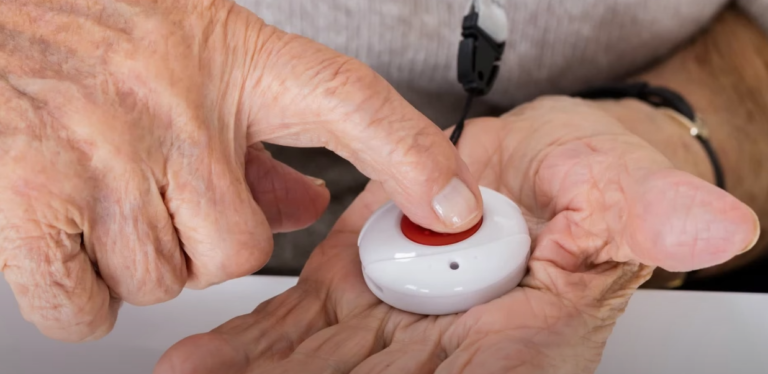
Mobile Devices and Wearables in Medical Alert Systems
As technology continues to evolve, so does the medical alert industry. Mobile devices and wearables have increasingly become a key part of medical alert systems, offering greater convenience and freedom to users.
Mobile Medical Alert Devices
Mobile alert systems use cellular technology to work anywhere with cell service, not just at home. This means users can take their protection with them on the go. These devices often include GPS tracking, which can pinpoint the user’s location in an emergency, whether at home, visiting a friend, or out shopping. Some mobile systems even include features like medication reminders or check-in services for added peace of mind.
Wearable Devices in the Medical Alert Industry
Wearable devices have added a layer of convenience and user-friendliness to medical alert systems. They typically come in a pendant or wristband, but newer models can take the form of watches or even smart jewelry. The primary function of these wearables is to initiate a call for help, usually by pressing a button. Some advanced wearables can automatically detect falls and signal the monitoring center without any action from the user.
The advantage of wearables is their convenience – they’re always on your person, lightweight, water-resistant, and often inconspicuous. Many companies design their wearable devices to be discreet, understanding that users may want the security of an alert system without drawing attention to it.
These advancements in mobile and wearable technology have greatly expanded the functionality and convenience of medical alert systems, making them a more versatile tool for ensuring personal safety. Whether at home or on the go, these devices provide users with reassurance and immediate access to help when needed.
Choosing the Right Medical Alert System for Your Needs
With many excellent medical alert systems available, choosing the right one can feel overwhelming. Here are some factors to consider to help guide your decision and a look into the various packages offered by medical alert companies:
Factors to Consider:
- Your Lifestyle: Consider your daily routine and habits. If you’re very active and often leave your home, a mobile system with GPS might be the best choice. If you’re primarily homebound, an in-home system may suffice.
- Features: Decide which features are most important to you. This could include fall detection, GPS tracking, 24/7 monitoring, medication reminders, or caregiver tools. Your health condition and personal circumstances can help you determine the necessary features.
- Price: Your budget is an important factor. Look at both the upfront costs and the ongoing monthly fees. Be sure to check if there are additional costs for add-ons or features.
- Contract Terms: Some companies require long-term contracts, while others offer more flexibility with month-to-month options. Consider your long-term plans and potential changes in your living situation or health.
- Reliability and Reputation: Research each company’s reputation. Read reviews and consider factors like how long they’ve been in business, their monitoring center’s quality, and response time.
Medical Alert System Packages:
Medical alert system providers typically offer packages tailored to various needs and budgets. Basic packages often include a base unit and wearable help button, with 24/7 professional monitoring.
More advanced packages could include mobile systems for on-the-go protection, automatic fall detection, or integrated health monitoring (like heart rate or sleep patterns). Some even offer additional services like lockboxes for home entry during emergencies, protection from home intrusions, or caregiver tools like check-in services and geofencing.
Choosing the right medical alert system comes down to understanding your needs, lifestyle, and budget. There’s no one-size-fits-all solution, so take the time to consider your unique situation and compare the offerings of various companies. In doing so, you can find a system that provides the features you need and the peace of mind you deserve.
Frequently Asked Questions:
What does a monitored medical alert system mean?
Monitored medical alert systems mean the system is connected to a 24/7 response center. When the alert button is pressed, a signal is sent to the response center, and an operator will immediately reach out to the user through the system’s built-in speaker. The operator can then assess the situation and dispatch appropriate help if needed.
What is a personal emergency response system (PERS)?
Personal emergency response systems (PERS) or medical alert systems allow users to call for help with an emergency button. PERS devices usually consist of a base unit and a wearable help button and can connect the user to a response center or a pre-selected contact.
Who are the emergency responders in a medical alert system?
When an alert is triggered, the call goes to a response center, where trained operators evaluate the situation. They can then alert appropriate emergency services (like the police, fire department, or ambulance), depending on the nature of the emergency. Many medical alert systems can also be set up to contact family members or caregivers.
Are there many types of medical alert systems?
Yes, there are many types of medical alert systems. The most common are in-home systems, which work within a certain base unit range, and mobile systems, which work anywhere there’s cell service. They can also vary by features, like fall detection, GPS tracking, or health monitoring.
What is the average monthly cost for a medical alert system?
The cost for a medical alert system can range from around $20 to over $50 per month. The monthly costs depend on the medical alert providers and the package chosen, with premium features like fall detection or GPS tracking often costing extra. Some companies also charge an initial equipment fee.
How does a medical alert system work?
Medical alert systems work by connecting the user to help at the press of a button. When the button on the base unit or wearable device is pressed, the system connects to a response center. The operator at the center can communicate with the user through a speaker on the device, evaluate the situation, and then dispatch emergency services or contact a caregiver as needed.
The Bottomline:
Choosing the right medical alert system is a significant decision that directly impacts your safety and peace of mind. Remember, the “best” medical alert provider isn’t about having the most advanced features or being the most expensive. It’s about finding a solution that aligns with your lifestyle, health requirements, and budget. Whether you’re an active senior wanting to maintain independence, a person living with a chronic condition, or a family caregiver desiring to ensure a loved one’s safety, a medical alert system can meet your specific needs.
Navigating the medical alert industry can seem overwhelming due to the plethora of choices. However, you can make a confident decision by comprehensively understanding your needs, thoroughly researching your options, reading reviews, and possibly trying out a few systems.
Ultimately, the goal is to enhance safety and provide immediate access to emergency help when needed. The peace of mind that comes with knowing help is just a button press away is immeasurable, making a medical alert system a worthy investment.
